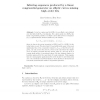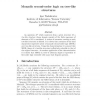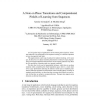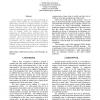54 search results - page 4 / 11 » Inference of Finite Automata Using Homing Sequences |
DCC
2007
IEEE
14 years 7 months ago
2007
IEEE
Let p be a prime and let E(IFp) be an elliptic curve defined over the finite field IFp of p elements. For a given point G E(IFp) the linear congruential genarator on elliptic curv...
NIPS
2003
13 years 9 months ago
2003
We explore the phenomena of subjective randomness as a case study in understanding how people discover structure embedded in noise. We present a rational account of randomness per...
TCS
2002
13 years 7 months ago
2002
An operation M which constructs from a given structure M a tree-like structure whose domain consists of the finite sequences of elements of M is considered. A notion of automata r...
JIIS
2008
13 years 7 months ago
2008
An ever greater range of applications call for learning from sequences. Grammar induction is one prominent tool for sequence learning, it is therefore important to know its proper...
ICRA
2003
IEEE
14 years 1 months ago
2003
IEEE
We present an approach that uses Q-learning on individual robotic agents, for coordinating a missiontasked team of robots in a complex scenario. To reduce the size of the state sp...




